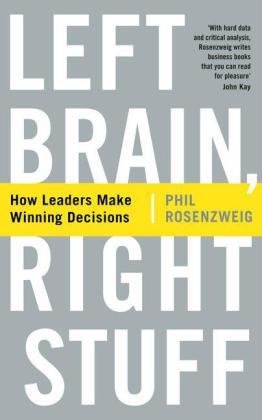Dozens of books have been published recently on the errors and biases that affect our judgments and choices. Drawing on cognitive science, their lessons are excellent for many kinds of decisions - consumer choice and financial investments, for example - but stop short of addressing many of the most important decisions we face in management, where we can actively influence outcomes and where competitive forces mean we have to outperform rivals.
As Phil Rosenzweig shows, drawing on examples from business, sports and politics, this sort of decision-making relies on mastering two very different abilities. First, the analytical problem-solving skills associated with the brain's left hemisphere; and second, what Tom Wolfe called 'the Right Stuff': the ability to take calculated risks. Bringing fresh and often surprising insights to topics including confidence and overconfidence, the uses and limits of decision models, leadership and authenticity, expert performance and deliberate practice, competitive bidding and new venture management, Left Brain, Right Stuff , the myth-busting follow-up to The Halo Effect , explains how to perform when making even the most difficult decisions.


